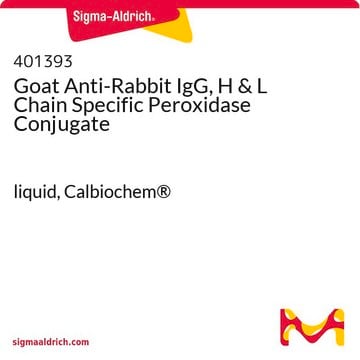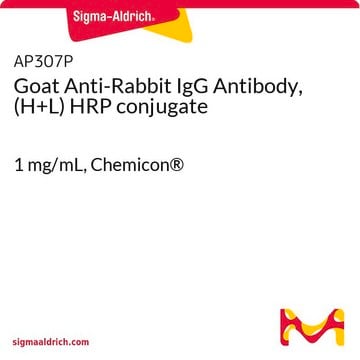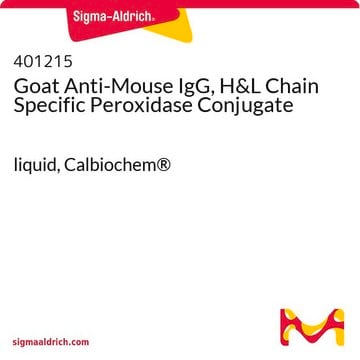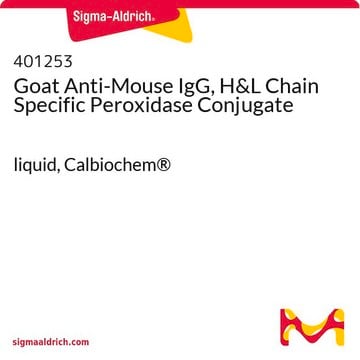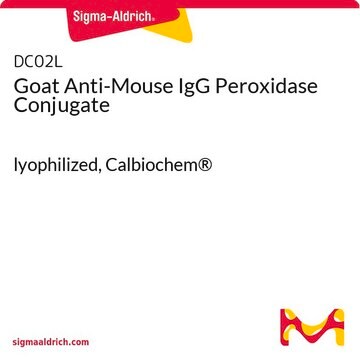401353
Goat Anti-Rabbit IgG, H & L Chain Specific Peroxidase Conjugate
liquid, Calbiochem®
Sign Into View Organizational & Contract Pricing
All Photos(1)
About This Item
UNSPSC Code:
12352203
NACRES:
NA.46
Recommended Products
biological source
goat
Quality Level
antibody form
affinity isolated antibody
antibody product type
secondary antibodies
clone
polyclonal
form
liquid
contains
0.02% Thimerosal as preservative
manufacturer/tradename
Calbiochem®
storage condition
do not freeze
isotype
IgG
shipped in
wet ice
storage temp.
2-8°C
target post-translational modification
unmodified
General description
Adsorbed against bovine, horse, and human serum proteins.
Immunoaffinity purified goat polyclonal antibody adsorbed against normal human, bovine, and horse serum proteins and conjugated to horseradish peroxidase (HRP). Recognizes rabbit IgG, heavy and light chains.
This Goat Anti-Rabbit IgG, H & L Chain Specific Peroxidase Conjugate is validated for use in Enzyme Immunoassay, Immunoelectrophoresis for the detection of Rabbit IgG, H & L Chain Specific.
Application
Enzyme Immunoassay (1:10,000)
Immunoelectrophoresis (see comments)
Immunoelectrophoresis (see comments)
Warning
Toxicity: Standard Handling (A)
Physical form
In 10 mM PBS, 0.5 mM EDTA, 10% mannose, 2% sucrose, 1% BSA, pH 7.6.
Other Notes
Specificity for rabbit IgG, heavy and light chains, determined by ELISA against normal rabbit serum. Cross-reactivity with normal bovine, horse, and human sera is <2% by direct solid phase immunoassay. Variables associated with assay conditions will dictate the proper working dilution.
Legal Information
CALBIOCHEM is a registered trademark of Merck KGaA, Darmstadt, Germany
Disclaimer
To comply with ban of sale of mercury-added products required by The Interstate Mercury Education and Reduction Clearinghouse (IMERC), this product is prohibited to be sold in the following US states: Rhode Island and Connecticut.
Not finding the right product?
Try our Product Selector Tool.
Storage Class Code
12 - Non Combustible Liquids
WGK
WGK 2
Flash Point(F)
Not applicable
Flash Point(C)
Not applicable
Certificates of Analysis (COA)
Search for Certificates of Analysis (COA) by entering the products Lot/Batch Number. Lot and Batch Numbers can be found on a product’s label following the words ‘Lot’ or ‘Batch’.
Already Own This Product?
Find documentation for the products that you have recently purchased in the Document Library.
Hye-Soo Park et al.
Scientific reports, 9(1), 4246-4246 (2019-03-14)
Macrophages are responsible for innate and adaptive immune response activation necessary for eliminating infections. Optimal activation of macrophages to phagocytize Mycobacterium tuberculosis is critical in anti-mycobacterial defense. Here, we identified a novel Rv3463 hypothetical protein that induces macrophage activation in
Min-Kyung Yeo et al.
Translational oncology, 11(1), 109-115 (2017-12-09)
Partitioning defective (Par) proteins regulate cell polarity and differentiation. Par3, Par6β, and protein kinase Cζ (PKCζ), which are PAR complex members, have been shown to be associated with oncogenesis and progression. Herein, we report the expression pattern and clinical relevance
Valentina Agnolon et al.
Scientific reports, 10(1), 3016-3016 (2020-02-23)
Circulating HER2 extracellular domain (HER2 ECD) levels were proposed as a surrogate for HER2 tissue expression to monitor breast cancer patients for early relapse or responses to standard or HER2-targeted therapies, such as the monoclonal antibody (mAb) trastuzumab. Currently, available commercial
Yvonn Heun et al.
Scientific reports, 10(1), 3672-3672 (2020-03-01)
The pro-inflammatory adipokine resistin induces a phenotypic switch of vascular smooth muscle cells (VSMC), a process decisive for atherosclerosis, including morphological changes, increased synthetic activity, proliferation and migration. The guanine-exchange factor ARNO (Cytohesin-2) has been shown to be important for
Ju Seok Kim et al.
Anticancer research, 39(12), 6711-6722 (2019-12-08)
Autophagy is a cellular mechanism that recycles cellular components to maintain homeostasis. To investigate the clinical implication of autophagy in gastric cancer, the autophagy markers with autophagosome formation, LC3B and selective autophagy substrate p62/SQSTM1 (P62) were validated. LC3B and p62
Our team of scientists has experience in all areas of research including Life Science, Material Science, Chemical Synthesis, Chromatography, Analytical and many others.
Contact Technical Service
